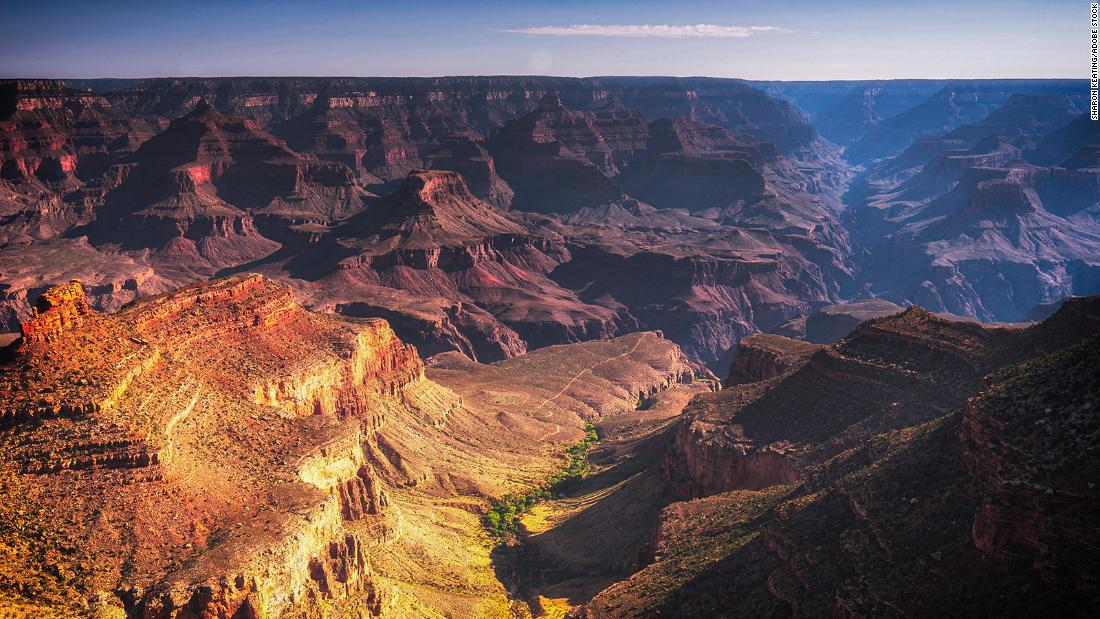(Trends Wide) — A destination in Arizona’s Grand Canyon National Park will change its current name because it is considered “offensive.”
Indian Garden, a popular stop on the park’s Bright Angel Trail, will now be renamed Havasupai Gardens.
The name change is an attempt to correct a historical error. Members of the Havasupai tribe, who had been there for generations, were driven out of the inner canyon rim area by the National Park Service nearly 100 years ago. Later, the area called Ha’a Gyoh by the Havasupai was renamed the Indian Garden.
“The Grand Canyon National Park team is proud to be working together with the Havasupai Tribal Council on a joint initiative to rename this culturally significant place,” Ed Keable, park superintendent, said in a statement.
“The Havasupai people have occupied this area since time immemorial, before the lands were designated as a national park and until the park forcibly evicted them in 1926. This name change is long overdue. It is a sign of respect for the hardships imposed on the Havasupai people”. The timing of the announcement is auspicious, as November is National Native American Heritage Month.
“Each year, approximately 100,000 people visit the area trekking the Bright Angel Trail, largely unaware of this history,” tribal Chairman Thomas Siyuja, Sr. said in the statement.
Calling the previous name “offensive,” he added that “the name change of this hallowed place to Havasupai Gardens (Havasupai Gardens) will finally correct that mistake.”
The Grand Canyon is not the only destination in North America seeking to redress indigenous communities by changing their names.
Known as Squaw Valley Alpine Meadows, the Olympic ski venue in California changed its name to Palisades Tahoe in 2021.
The area administration recognized the “racist and sexist” history of the word “squaw” (Indian woman) and involved members of the local Washoe tribe in the decision process to choose the new nickname.
In Canada’s Jasper National Park, a group of lodges formerly called Pocahontas Cabins became Miette Mountain Cabins earlier this year.
Parks Canada said it had worked with the Jasper Indigenous Forum, which represents more than 25 groups, to implement the name change.
And there are other reasons why a destination may opt for a new name.
Suicide Six, a ski resort in Vermont, was renamed Saskadena Six because “the feelings evoked by the word ‘suicide’ can have a significant impact on many members of our community.”
Now, it’s the Grand Canyon’s turn to transform.
Signs and other markers are already being changed to reflect the new Havasupai Gardens name. A baptism ceremony is being planned for spring 2023.
“I am glad to see that we will always remember and honor the true story of my family’s forced relocation caused by the development of Grand Canyon National Park,” said Carletta Tilousi, a member of the Havasupai Tribe and former council member.
“I hope this historic action will help other tribes take similar steps and reclaim land by renaming places for historic and cultural preservation.”
(Trends Wide) — A destination in Arizona’s Grand Canyon National Park will change its current name because it is considered “offensive.”
Indian Garden, a popular stop on the park’s Bright Angel Trail, will now be renamed Havasupai Gardens.
The name change is an attempt to correct a historical error. Members of the Havasupai tribe, who had been there for generations, were driven out of the inner canyon rim area by the National Park Service nearly 100 years ago. Later, the area called Ha’a Gyoh by the Havasupai was renamed the Indian Garden.
“The Grand Canyon National Park team is proud to be working together with the Havasupai Tribal Council on a joint initiative to rename this culturally significant place,” Ed Keable, park superintendent, said in a statement.
“The Havasupai people have occupied this area since time immemorial, before the lands were designated as a national park and until the park forcibly evicted them in 1926. This name change is long overdue. It is a sign of respect for the hardships imposed on the Havasupai people”. The timing of the announcement is auspicious, as November is National Native American Heritage Month.
“Each year, approximately 100,000 people visit the area trekking the Bright Angel Trail, largely unaware of this history,” tribal Chairman Thomas Siyuja, Sr. said in the statement.
Calling the previous name “offensive,” he added that “the name change of this hallowed place to Havasupai Gardens (Havasupai Gardens) will finally correct that mistake.”
The Grand Canyon is not the only destination in North America seeking to redress indigenous communities by changing their names.
Known as Squaw Valley Alpine Meadows, the Olympic ski venue in California changed its name to Palisades Tahoe in 2021.
The area administration recognized the “racist and sexist” history of the word “squaw” (Indian woman) and involved members of the local Washoe tribe in the decision process to choose the new nickname.
In Canada’s Jasper National Park, a group of lodges formerly called Pocahontas Cabins became Miette Mountain Cabins earlier this year.
Parks Canada said it had worked with the Jasper Indigenous Forum, which represents more than 25 groups, to implement the name change.
And there are other reasons why a destination may opt for a new name.
Suicide Six, a ski resort in Vermont, was renamed Saskadena Six because “the feelings evoked by the word ‘suicide’ can have a significant impact on many members of our community.”
Now, it’s the Grand Canyon’s turn to transform.
Signs and other markers are already being changed to reflect the new Havasupai Gardens name. A baptism ceremony is being planned for spring 2023.
“I am glad to see that we will always remember and honor the true story of my family’s forced relocation caused by the development of Grand Canyon National Park,” said Carletta Tilousi, a member of the Havasupai Tribe and former council member.
“I hope this historic action will help other tribes take similar steps and reclaim land by renaming places for historic and cultural preservation.”






